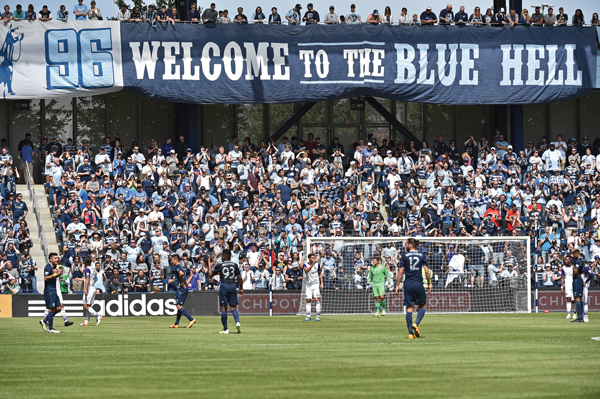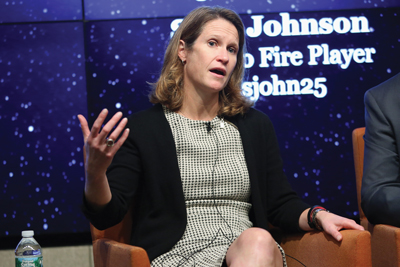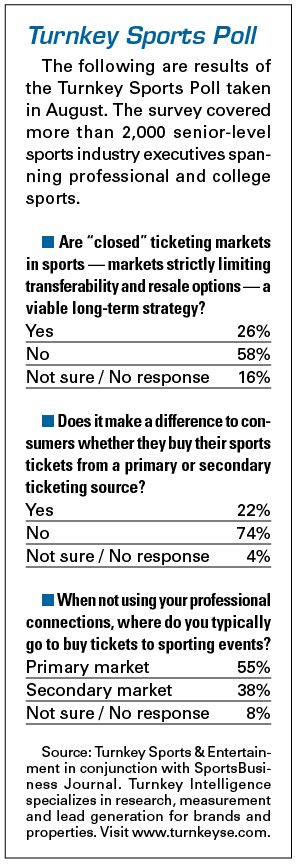Kathy Carter, president of Soccer United Marketing, was originally just looking for a sponsorship deal in the ticketing category when she and Major League Soccer happened upon something much bigger.
While SUM reviewed potential ticket partners for MLS over the past year, New York-based ticket aggregator SeatGeek presented a different idea. Instead of a straightforward, marketing-based agreement, SeatGeek proposed creating an open ticketing system in which soccer fans could securely buy and sell tickets on dozens of different third-party websites and mobile applications.
Rather than trying to persuade fans to use officially sanctioned team or ticketing destinations, fans could obtain MLS tickets where they were already consuming content and engaging in commerce, such as travel sites, ride-sharing apps, fan blogs or social media platforms. The concept seeks to invert years of common sports industry practice in which leagues and teams often push fans toward preferred ticketing platforms.
“The basic idea, of course, was to figure how to sell more tickets, but the conversation soon became more than
 |
The new SeatGeek Open platform will be used by Sporting Kansas City for primary and secondary ticket sales beginning in 2017.
Photo by: Getty Images |
that,” Carter said. “There’s a fundamental shift happening in the industry. You have to go to the fans, not the other way around. So instead of moving toward an open ticketing platform, our decision was to actually be open.”
The MLS partnership, announced in late July, serves as a cornerstone for the creation of SeatGeek Open, the company’s new box office system that also will serve Sporting Kansas City as the club’s official primary and secondary ticketing provider beginning in 2017. SeatGeek’s new platform is supported by software from South Carolina-based technology firm TopTix.
“What is the future of the event-going experience?” said Russ D’Souza, SeatGeek co-founder. “We have already seen other areas of e-commerce go in this direction, and we believe ticketing needs this same kind of openness and free choice for the fan.”
SeatGeek, however, is far from alone in pushing in some fashion for a more open ticketing landscape. Nearly every other major ticketing provider, including Ticketmaster, StubHub and AXS, sells ticket inventory in places such as Facebook or Groupon that are not their own marketplaces or those branded by team and venue partners. They also operate various versions of developer platforms that provide access into portions of their ticketing systems. The move is somewhat analogous to airlines and hotel companies selling ticket and room inventory on external and affiliate sites such as Expedia or Travelocity.
“This move toward greater access to ticketing is really the next big change in the industry,” said Dave Butler, president and chief executive of Spectra Ticketing & Fan Engagement.
Ticketmaster in particular moved roughly 10 percent of its more than 100 million tickets sold in North America last year on platforms other than its own. But unlike the travel industry, sports remains an emotionally charged business in which fans openly root for the success for their favorite teams, with that emotion carrying over to the ticket-buying experience. And that requires a much more nuanced approach, both in terms of ticket distribution and marketing, than simply treating a ticket as a pure commodity than can be bought and sold on multiple sites.
As a result, moving toward fully open ticketing systems is much more easily said than done. Any move toward selling tickets on additional sites requires an extended series of economic and marketing agreements with partners, data sharing covenants, and technology allowing for seat inventories to be continually updated in real time. In addition, teams and venues must carefully calibrate how much inventory is allocated to each distribution channel, and how the availability of each distribution point is communicated to fans.
To that end, many rival ticketing companies to SeatGeek have privately grumbled that the MLS deal may not ultimately amount to much more than a flashy press release, and does not actually involve a substantial amount of primary ticket inventory.
“Saying you’re open and being open are two different things,” said Jared Smith, president of Ticketmaster North America. “Selling in additional venues is great, but the ultimate question is, What is the overall, holistic strategy? The question to me is less about off-platform selling or not, and more about how to sell tickets most efficiently and do it at scale.”
Finding new buyers
Regardless of the specific approach, the core idea behind a shift toward more open ticketing lies in selling additional tickets to more people, particularly ones that historically have not been buyers of live entertainment.
Ticketmaster, for example, estimates that more than 60 percent of its ticket buyers not purchasing directly on their platforms are entirely new to the company’s already massive user database. Other major ticketing companies report similar results finding new buyers, new sales leads and more data and analytics through more open selling strategies.
 |
Said SUM's Kathy Carter, “There’s a fundamental shift happening in the industry. You have to go to the fans, not the other way around.”
Photo by: Getty Images |
The widely coveted millennial audience, similarly, does not seek out tickets in the same ways as preceding generations and has less tolerance for traditional ticket purchasing processes.
“We all need to be expanding access to live entertainment,” said Patrick Ryan, co-founder of Houston-based ticketing company Eventellect, which works with numerous pro teams, including several MLS clubs. “Because it’s not really baseball versus football or anything like that. It’s live events versus TV. Even things like ‘Pokémon Go’ have an impact on my business. So if having tickets eventually available on something like Uber helps bring fans to more events, that’s precisely the kind of proactive marketing we need.”
Ryan projected that the MLS-SeatGeek deal would not necessarily see massive ticket sales at the outset, particularly among higher-priced inventory. Rather, he sees the deal as a tool toward identifying new fans that eventually can be moved up the ladder toward larger purchases, as well as toward other live events.
“It’s really not an MLS play, per se, but a future play,” Ryan said.
That core mentality, similarly, has driven StubHub to pursue several types of deals beyond those simply establishing the company as a team or property’s official resale marketplace, such as a new deal with the Philadelphia 76ers blending primary and secondary inventory.
And for StubHub, as well as most of its rivals, the hope is that using more open ticketing systems that efficiently package tickets with other elements such as parking, merchandise and companion services will yield far richer customer data.
“The goal is to reduce friction in people’s lives and get people to events,” said Perkins Miller, StubHub general manager of North America. “That’s leading now to much broader conversations with rights holders.”
Access rules
The argument against a more open ticketing system and for a more closed environment lies heavily around issues of security, fraud, illegal broker activity fueled by bots (see story), and heavy amounts of arbitrage around ticket resales.
On the concert side of the business, artists such as Metallica and Radiohead have employed paperless ticketing
methods requiring users to show identification to gain access. But such methods have often proved unpopular with fans, have not migrated heavily to sports, and many ticket buyers remain insistent on the ability to resell purchased seats.
“Limiting transferability isn’t necessarily the answer to arbitrage,” said Bryan Perez, AXS president and chief executive.
Still, creating a truly diverse distribution network for tickets remains a difficult process.
“There’s lots of people who can sell and market, and that’s great, but there’s still really one system of record, one access control system, and all those pieces have to work together seamlessly,” Perez said.
The notion of tickets available anywhere at any time also potentially threatens the value of season tickets, which have for decades been a crucial financial underpinning for the vast majority of the sports industry. More fluid ticket concepts such as monthly ticket passes sold by many teams without defined seat locations have already been a hedge against this threat.
But SUM’s Carter said she was not concerned about what an open ticketing landscape would do to the core season-ticket business in MLS. Many clubs in that league, as well as in other sports, have successfully shifted toward a membership model in which season tickets are supplemented by other benefits such as experiential awards, exclusive merchandise, and even in some cases the ability to vote on franchise initiatives.
“The idea of a season ticket now is very different than what it was 20 years ago,” Carter said. “We’ve seen a lot of other benefits and amenities baked into that. But in each instance between the membership model, groups or single-game sales, we’ll look to put the fan first.”






